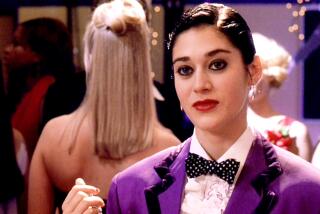Jack Gilford, 82; Actor Graced Both Farce and Tragedy
Jack Gilford, the sad-eyed tragi-comedian whose warm, puckish countenance graced stages, nightclubs and films for more than 50 years, died Monday morning.
Gilford was 82 and died at his home in New York City’s Greenwich Village after a long struggle with stomach cancer.
He had been in the hospital until two weeks ago, said Merle Debuskey, his friend and publicist. His actress wife, Madeline Lee, was with him when he died.
Gilford was twice nominated for Tony awards--as Hysterium, the slave who ends up in women’s clothes in “A Funny Thing Happened on the Way to the Forum” and sings “I’m Lovely,” and as Herr Shultz in “Cabaret.”
A product of the creaking vaudeville houses of the early 1930s, he became famous for his ability to shift dramatic gears. His repertoire ranged from animal impressions (“This is an eagle who has just learned his daughter is pregnant”) to the haunting persona of the naive business partner in the film “Save the Tiger,” for which he was nominated for an Academy Award as best supporting actor.
On Broadway he was seen also in “The Diary of Anne Frank,” “The Tenth Man,” “The World of Sholom Aleichem” (also on television) and “Romanoff & Juliet.”
Typically, Gilford portrayed the ordinary, common man confounded and eventually overwhelmed by sophistication or circumstance.
He performed as the mute king with Carol Burnett in stage and television versions of “Once Upon a Mattress,” and did guest turns on numerous TV comedy and dramatic series, including “The Defenders,” “All in the Family,” “Rhoda,” “The Love Boat,” “Taxi,” “Soap,” “Head of the Class” and “The Golden Girls.”
One of his most memorable performances was opposite Carroll O’Connor in an “All in the Family” episode. He portrayed an old watchmaker who invented a gadget that O’Connor’s Archie Bunker thought would make both men rich. It was an electronic device that rings doorbells from a distance.
As both men dance around the Bunker living room singing “If I Were a Rich Man” from “Fiddler on the Roof,” Gilford’s character collapses and dies.
Gilford also was known as a television pitchman for Cracker Jack, in which he and a group of children fought over the confection.
A few years ago he melded his varied repertoire into a one-man show (seen in Los Angeles in 1987) titled: “My Life in the Theatre, or How I Became an Overnight Success in 40 Years.”
A significant, off-beat triumph was as the drunken jailer, Frosch, in the Metropolitan Opera’s production of “Die Fledermaus.”
He did the nonsinging part in the 1950 production and many later ones.
“I also played a single act at the Palace (vaudeville theater) in that same year. There are not too many people who played the Met and the Palace in the same year,” he once told the Associated Press.
But a 1956 subpoena by the House Committee on Un-American Activities put his career in limbo for several years. He denied being a Communist but refused to say whether he had resigned from the party to be able to sign an affidavit of non-membership.
“One day the phone just stopped ringing and I didn’t do TV or films for 10 years,” Gilford said.
Born Jacob Gellman and raised in Brooklyn, Gilford began his career in 1934 at an amateur night on a stage in the Bronx.
He got work in vaudeville and such nightclubs as Cafe Society in New York, toured four years with Milton Berle and Ina Ray Hutton and began appearing in Broadway revues in 1939.
With his wife, whom he married in 1949, and Zero and Kate Mostel, he wrote “170 Years of Show Business.”
More to Read
Only good movies
Get the Indie Focus newsletter, Mark Olsen's weekly guide to the world of cinema.
You may occasionally receive promotional content from the Los Angeles Times.






